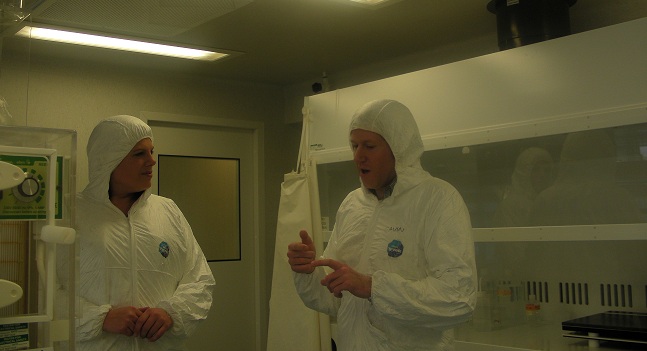“Descent Into The Icehouse” Meeting in Cardiff
On Tuesday the 21st of February, members from various institutions convened at Cardiff University to discuss the Descent into the Icehouse project. The event, chaired by Professor Paul Pearson, was used as a platform for new postgraduates to briefly outline their project and for postdoctoral research associates (PDRAs) to discuss any preliminary data gathered so far. The meeting was twinned with the UK Ocean Acidification (UKOA) project which focuses on human-induced pH change and its potential effect on ocean-dwelling microorganisms such as foraminifera and coccolithophores.

Phil Williamson from the University of East Anglia and Rob Thomas, and the British Oceanographic Data Centre (BODC) respectively, began proceedings with an overview of the UKOA project and the methods of data collation. The remainder of the morning session was designated to new postgraduates and allowed them to discuss their project and detail what they have achieved so far.
The afternoon session was assigned to PDRAs from both the UKOA and Descent project. Trazy Aze, from Cardiff, discussed the use of foraminifera to elucidate past environmental conditions during the Palaeocene-Eocene Thermal Maximum (PETM) (55.6Ma), an analogue for current anthropogenic-induced warming. Marcus Gutjahr, from NOC, Southampton, examined the application of boron isotopes to pH and pCO2 reconstruction while Sam Gibbs, also from NOC, Southampton, focused on the response of calcareous nannofossils to periods of extreme warmth. Eleanor John of Cardiff University explained how we can use foraminifera to understand the water column of ancient oceans before Eleni Anagnostou detailed the improvements in boron isotope measurements. Kirsty Edgar of Cardiff rounded off proceedings with a brief overview of the mid-Eocene climatic optimum (MECO) and the ways in which we can reconstruct the sea surface temperature during that period.
Following discussion, the group adjourned to the pub for more discussion and a well-earned drink.
Caroline Nokes MP, visit at NOC
On the 15th of February, project PI Gavin Foster hosted Mrs. Caroline Nokes, MP for Romsey and Southampton North, at the National Oceanography Centre, Southampton (NOC). Gavin was paired with Caroline as part of the Royal Society MP-Scientist pairing scheme and he spent a week in Westminster in October 2011 attending several select committee meetings, learning about how scientific knowledge is used in policy-making and discovering how an MP spends her time in Westminster.
Figure 1: Gavin shows Caroline some 2 million year old deep sea sediment from the North Atlantic
As a member of the House of Commons Environmental Audit Committee, Caroline has a keen interest in Science and the Environment. Her day at NOC started with an introduction to the activities of the NOC and OES and a tour of the centre. Caroline had the opportunity to explore some of our exciting projects including the Lake Ellsworth project and some of our facilities, such as BOSCORF and the remotely operated vehicles (ROVs).
Figure 2: Gavin arm waving about boron isotope geochemistry in the isotope lab
The aim of the scheme is to build bridges between parliamentarians, civil servants and research scientists and give MP’s the opportunity to explore the science behind their decisions. So, after a lunch with Gavin’s boron group, Caroline ventured down to the lab and got some first hand experience of boron isotope geochemistry from sample preparation and chemistry to mass spectrometry. (Figures)
Figure 3: Gavin explaining the fundamentals of mass spectrometry to Caroline in the mass spectrometry lab
We ended the busy day with a well-deserved coffee where Caroline met and discussed a variety of topics with a few other scientists from the NOC. Gavin said of the visit: “the Royal society pairing scheme is a great way to meet politicians and talk to policy makers directly about your science. I learnt a lot in Westminster and explaining the importance of palaeoclimate research in one afternoon was a challenge, but I think Caroline left the NOC with a real idea of the value of a deep time perspective on climate change.”
Links
Follow us on Twitter
Recent Posts
- In the News : What a three-million year fossil record tells us about climate sensitivity
- Past evidence confirms recent IPCC estimates of climate sensitivity
- Crucial new information about how the ice ages came about : PR & Podcast
- 2014 Sino-UK Coevolution of Life and the Planet Summer School
- Past and Future CO2 – Reconstructing atmospheric Carbon Dioxide







